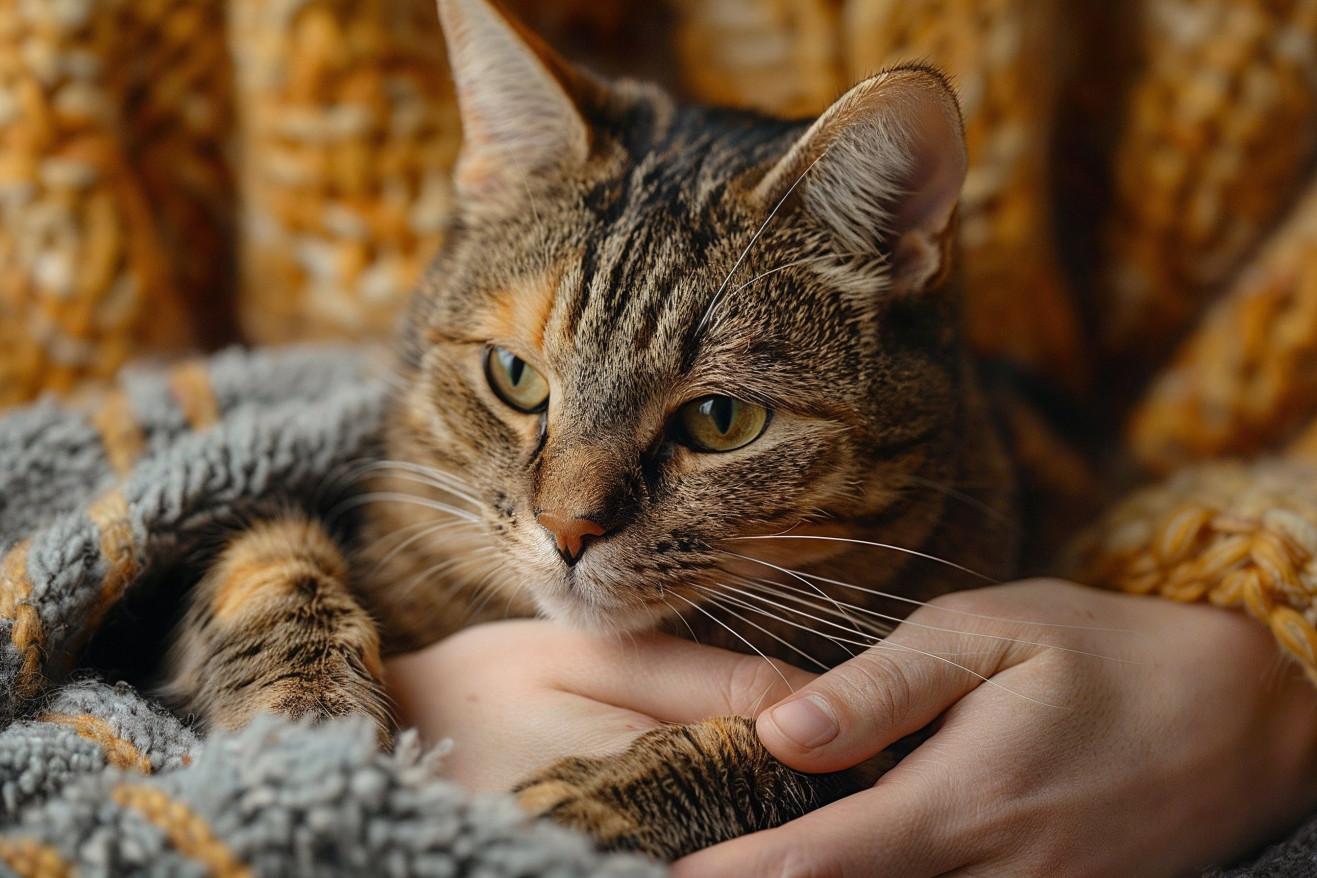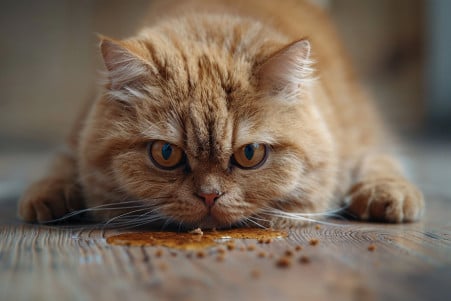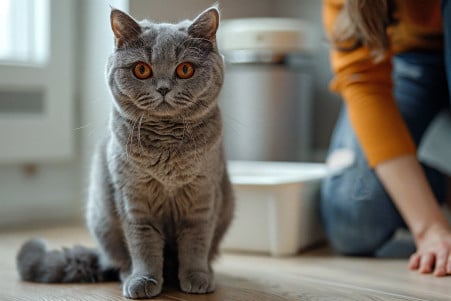Why Does My Cat Smell Like Poop? Causes and Solutions
11 May 2024 • Updated 9 May 2024

If you've noticed that your cat has started to smell like poop, there are a number of potential causes that could be to blame, ranging from dietary and health issues to behavioral problems. For example, poor diet and conditions like inflammatory bowel disease can lead to smelly feces that can get caught in your cat's fur. This is especially true if your cat is a longhaired breed and has trouble grooming itself. In addition, impacted anal glands or an infection can also lead to your cat smelling like poop.
To help you get to the bottom of this stinky situation, we've researched the latest findings from veterinary science and animal behavior experts. This in-depth investigation will walk you through a variety of dietary changes, grooming tips, and medical treatments that can help you get rid of your cat's smelly issue. By providing you with real solutions and a better understanding of cat health and behavior, you'll be better prepared to bring back your cat's fresh, snuggly scent.
Why does my cat smell like poop?
Diet and Other Causes of Smelly Cat Poop
A cat's diet is a major factor in the smell of their poop. Protein-heavy diets, which are often found in many commercial cat foods, can result in more pungent poop because of the higher levels of waste products that result from breaking down animal-based protein. In addition, low-quality or highly processed cat foods can lead to smelly poop because they are harder to digest and contain nutrient imbalances that result in more undigested material in the stool.
In addition, if a cat has recently changed their diet or a new food has been introduced, it can lead to temporary smelly poop as the cat's digestive system adjusts to the new food. This is because different foods have different nutrients, and those nutrients may require different bacteria in the gut to break them down. When the new food is introduced, the bacteria in the gut may be out of balance, which can lead to gas and smelly poop. Once the bacteria in the gut has adjusted to the new food, the smelly poop should subside.
To reduce the smell of your cat's poop, you may want to consider adding more fiber to their diet. According to Purina, this can be done by adding fiber-rich foods or supplements to their diet. This can help improve digestion and lead to firmer, less smelly poop. This is because the fiber helps move food through the digestive system more quickly, which means that bacteria in the gut have less time to create smelly byproducts. By making a few changes to your cat's diet, you may be able to make their litter box a little less stinky.
Medical Conditions That Cause Stinky Cat Poop
Gastrointestinal issues, such as inflammatory bowel disease (IBD) or food sensitivities, can cause smelly poop. Bacterial infections or the presence of parasites in the GI tract can also cause poop to smell bad. Gastrointestinal bleeding, which can be caused by a number of different things, can result in a metallic or bloody smell in a cat's poop.
Some medications or supplements can cause a change in the smell of a cat's poop as a side effect. If the smelly poop continues and/or is accompanied by other symptoms, it could be a sign of an underlying medical condition that needs to be addressed by a vet.
Grooming and Litter Box Hygiene for Odor Control
Poor grooming, especially in long-haired cats, can lead to fecal matter getting stuck in the fur, which can cause odors. Catster explains that trimming the fur around the rear end can help remove any stuck fecal matter and reduce odors. Regular brushing and grooming are also important to make sure your cat stays clean.
Making sure to scoop the litter box every day and change the litter frequently is important for keeping odors at bay. Using unscented, high-quality litter and avoiding scented products can also help keep odors to a minimum, as suggested by Petfinder. In addition, having multiple litter boxes and placing them in well-ventilated areas can also help prevent odors from building up.
Good grooming and litter box habits are essential for keeping your cat's environment smelling fresh and clean. That said, if you're still noticing bad smells even after you've made sure to groom your cat and clean its litter box, it could be a sign of an underlying issue like anal gland problems that need to be addressed by a vet.
Anal Gland Problems and Smelly Cat Poop
Cats have two small anal glands that secrete a smelly liquid that is normally released when they poop. VCA Animal Hospitals notes that the anal sacs contain pheromones that are used to mark territory, and a small amount of the liquid is released each time a cat has a bowel movement.
However, when the glands get clogged or infected, they can cause a strong, long-lasting smell around the cat's behind. The Daily Paws says that when a cat has soft stool or diarrhea, it doesn't put enough pressure on the glands to release the liquid, which causes it to thicken and become harder to release.
Symptoms of anal gland issues include scooting, licking the area, and a bad smell, according to Glandex. Your vet may need to express the glands or prescribe antibiotics to help the problem and help your cat smell better.
How to Get Rid of Litter Box and Cat Odor
The most important thing you can do to keep litter box odors at bay is to make sure you clean and scoop the litter box regularly. You can also use baking soda or charcoal filters to absorb and neutralize odors in the litter box. Enzymatic cleaners and odor eliminators can also be used to break down and remove odors from accidents and spills.
Make sure the area where the litter box is located is well-ventilated and has good air circulation to prevent odors from getting trapped and building up. If odors are still a problem, you may need to call in a professional cleaning service to get rid of odors in carpets, upholstery, and other surfaces.
By staying on top of litter box maintenance and using odor-absorbing products, you can keep your home smelling fresh and free of cat odors. However, if you're still struggling with odors, it may be time to talk to your vet to make sure there isn't an underlying medical issue.
Conclusion: Understanding and Resolving Cat Odor Issues
If you’ve tried changing your cat’s diet and improving litter box cleanliness and your cat’s poop still smells bad, you may want to see a vet. Chronic foul-smelling stools, especially when they’re accompanied by other symptoms such as changes in appetite, weight loss, vomiting, or lethargy, may be a sign of an underlying medical condition that needs to be addressed by a professional.
If your cat’s poop suddenly becomes extremely smelly or if you notice blood in your cat’s poop, you should take your cat to the vet right away. Regular vet visits and fecal exams can help catch and treat any digestive or medical issues early. It’s important to talk to your vet to rule out more serious issues and make sure your cat is healthy.
While some smell is normal, especially for cat poop, chronic and extreme stink is not. By working with your vet, you can get to the bottom of the problem and make sure your cat is healthy and happy.


